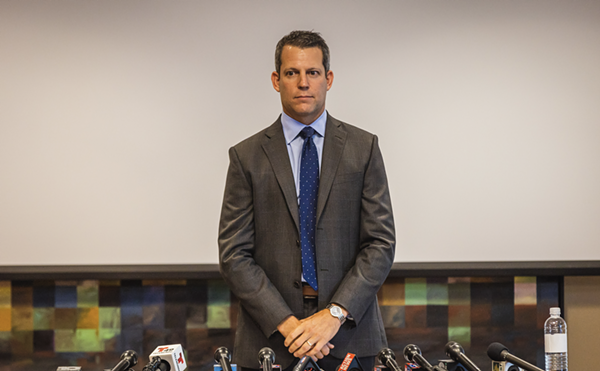Clint Eastwood's Million Dollar Baby is one of the few films I can think of from recent years that has actually benefited from a narrator's persistent voice-over. It doesn't hurt, of course, that the narrator is Morgan Freeman, delivering tersely lyrical dialogue in his best, sure and steady Shawshank manner. But what's really important here is the simple fact that a voice-over exists at all - an admittedly old-fashioned device that helps crystallize Million Dollar Baby's championing of traditional storytelling skills and its direct link to classics from decades past.
Smarts and occasional "re-inventions" aside, Eastwood is about as old-school a filmmaker as you'll find, and his unfussy expertise and love of genre filmmaking flow sure and true through Million Dollar Baby. This is a fight movie in the purest sense of the term, and, like all of the best fight movies, it's less about fighting and more about the fighters themselves. The fighters in Eastwood's new film include a variety of types, but the ones we're most interested in are brave but broken people trying to pick up the pieces of their lives and put them back together in some recognizable human shape.
And if that sounds a bit like a cliché, that's OK. Eastwood's best movies - Unforgiven, High Plains Drifter, Play Misty for Me (in parts), and now Million Dollar Baby - have all embraced clichés, turned them inside out by thoroughly understanding the power that made them clichés in the first place and, ultimately, transcended them. Million Dollar Baby brims with colorful, crusty old characters and colorful, crazy young ones, most of whom evoke cinematic and historical archetypes even as they stand on their own two feet as full-fleshed and entirely engaging creations.
Eastwood and screenwriter Paul Haggis position these characters (and us) in that uniquely male world of boxing and boxers - getting the textures, rhythms, language and movement of that world just right, even as its intrinsic maleness is quietly called into account by making the film's principal pugilist a woman.
Eastwood places himself at the very center of the movie, though, in the plum role of Frankie Dunn, the grizzled owner of a run-down gym where mostly second-rate and no-rate boxers come to train. Helping out around the place is Eddie "Scrap" Dupris (Freeman), a one-eyed former boxer managed long ago by Frankie, who now, in tried and true pulp-fiction tradition, feels silently responsible for Scrap's fall from grace.
Frankie's got his problems and he's no angel - a darkish past, an estranged daughter and a closet full of guilt and pain are hinted at - but, ultimately, he's a good man to have in your corner. He's also a bundle of contradictions, a simple, working-class stiff who reads Yeats and studies Gaelic on the side. He's the sort of guy who attends mass regularly, but mostly for the pleasure of annoying the priest with endless nitpicking about theological inconsistencies.
Frankie's a born button-pusher, a world-weary crank who wants to quit the fight game but can't because he claims he likes the stink too much. He's an archetypal tough guy, a man's man who doesn't even think twice about calling women's boxing a "freak show" - which is only one of the reasons for his surly skepticism when an aspiring fighter named Maggie Fitzgerald (Hilary Swank) takes up residence in the gym and begins pestering Frankie to manage her.
Maggie is actually a double underdog - not only is she a woman but, at 31, she's considered way too old to start a boxing career - but Frankie is eventually worn down by Maggie's persistence and raw talent, and the reluctant trainer soon has her booked in a series of bouts where she's knocking out everyone in sight.
Million Dollar Baby becomes more action-oriented (and a more traditional crowd-pleaser) as it follows the upward-bound, Rocky-esque arc of the young fighter's career, but the film's essence remains reflective and character-driven as it goes about revealing the process by which Frankie and Maggie become a surrogate family to each other. (There are the slightest of hints that the affection might be just a touch more than professional, but, happily, Eastwood seems to have finally backed off from that May-December romance game he's been playing on screen for way too long.)
You're probably aware of all the hype surrounding this film, and particularly about the unexpected direction that Million Dollar Baby takes during its last act. It would be unfair to the movie and to its potential audience to say more about how and where Million Dollar Baby ends, but be assured that it's effectively played by Swank, Eastwood and especially Freeman (the film's secret weapon), and that for each tragedy that emerges there is also a small sense of satisfaction and maybe even a hint or two of redemption.
As for the hype, forget it. Well, don't forget it entirely - Million Dollar Baby probably is just about as good as you've heard - but it's good in an unassuming, no-frills way that might just leave you scratching your head at what all the fuss is about. The story is simple, but told with understated honesty and unaffected performances, with tough, nimble dialogue that quietly speculates on the idea of boxing as something both profound and profoundly unnatural.
Even the movie's visuals make the most of this low-key approach, with a subdued, almost monochromatic palette that resembles a color version of one of those gorgeous old black-and-white boxing films like Body and Soul, The Set-Up and, later on, Raging Bull. We can now add Million Dollar Baby to that short list of classics that embrace a time-honored formula only to rise above it.















